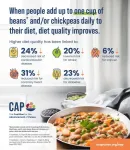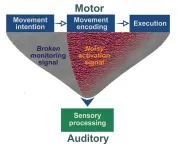(Press-News.org) In this study, the Cancer Research UK-funded scientists will establish the targets for the vaccine. They will find out which proteins on the surface of early-stage ovarian cancer cells are most strongly recognised by the immune system and how effectively the vaccine kills mini-models of ovarian cancer called organoids.
If this research is successful, work will then begin on clinical trials of the vaccine. The hope is that in the future, women could be offered this vaccine to prevent ovarian cancer in the first place.
There are around 7,500 new ovarian cancer cases every year in the UK, and it is the 6th most common cancer in women*. There is no current screening programme for the disease and some women with inherited copies of altered genes are at higher risk.
Ovarian cancer risk is up to 65% higher in women with altered BRCA1 genes, and up to 35% higher in women with altered BRCA2 genes, compared to women without these gene alterations**. Currently, women with BRCA1/2 alterations are recommended to have their ovaries removed by the age of 35, which means that they can’t have children in the future, and they experience early menopause.
Director of the Ovarian Cancer Cell Laboratory, MRC Weatherall Institute of Molecular Medicine at the University of Oxford and lead for the OvarianVax project, Professor Ahmed Ahmed, said:
“We need better strategies to prevent ovarian cancer. Currently women with BRCA1/2 mutations, who are at very high risk, are offered surgery which prevents cancer but robs them of the chance to have children afterwards. At the same time, many other cases of ovarian cancer aren’t picked up until they are in a much later stage.
“Teaching the immune system to recognise the very early signs of cancer is a tough challenge. But we now have highly sophisticated tools which give us real insights into how the immune system recognises ovarian cancer.
“OvarianVax could offer the solution to prevent cancer, firstly in women at high risk but also more widely if trials prove successful. Thanks to this funding, our research can take a big step forward towards a viable vaccine for ovarian cancer.”
Previous research by Professor Ahmed and his team at the University of Oxford has found that immune cells from ovarian cancer patients “remember” the tumour. Building on this research, the scientists will train the immune system to recognise over 100 proteins on the surface of ovarian cancer, known as tumour-associated antigens.
They will find out which of these antigens trigger the immune system to recognise and kill cells which are becoming ovarian cancer. Tissue samples from the ovaries and fallopian tubes of people with ovarian cancer will be used to recreate the early stages of ovarian cancer in the study.
The researchers will work with patient and public representatives to establish who would be willing to take the vaccine, who could benefit most from it, how it could be administered and how to ensure it is taken up by as many eligible women as possible, if it is successful in future clinical trials.
It will still take many years for the vaccine to reach a point where it is widely available to women at risk of ovarian cancer. However, this funding is an exciting step towards a world where doctors can prevent ovarian cancer at an early stage, rather than treating it once the disease has already taken hold.
OvarianVax is one of several projects funded under Cancer Research UK’s prevention research strategy, which aims to use discoveries in the lab to find more precise ways to prevent cancer.
Chief Executive of Cancer Research UK, Michelle Mitchell, said:
“Projects like OvarianVax are a really important step forward into an exciting future, where cancer is much more preventable. This funding will power crucial discoveries in the lab which will realise our ambitions to improve ovarian cancer survival.
“OvarianVax builds on the exciting developments in vaccine technology during the pandemic. This is one of many projects which we hope will give women longer, better lives, free from the fear of cancer.”
For media enquiries, contact Graeme Sneddon in the Cancer Research UK press office on 020 3469 5758 during business hours or call out of hours 020 3469 8301.
Notes to editor:
* https://www.cancerresearchuk.org/health-professional/cancer-statistics/statistics-by-cancer-type/ovarian-cancer
** https://www.cancerresearchuk.org/health-professional/cancer-statistics/statistics-by-cancer-type/ovarian-cancer/risk-factors#heading-Four
About Cancer Research UK
Cancer Research UK is the world’s leading cancer charity dedicated to saving lives through research, influence and information.
Cancer Research UK’s pioneering work into the prevention, diagnosis and treatment of cancer has helped save millions of lives.
Cancer Research UK has been at the heart of the progress that has already seen survival in the UK double in the last 50 years.
Today, 2 in 4 people survive their cancer for at least 10 years. Cancer Research UK wants to accelerate progress and see 3 in 4 people surviving their cancer by 2034.
Cancer Research UK supports research into the prevention and treatment of cancer through the work of over 4,000 scientists, doctors and nurses.
Together with its partners and supporters, Cancer Research UK is working towards a world where people can live longer, better lives, free from the fear of cancer.
For further information about Cancer Research UK's work or to find out how to support the charity, please call 0300 123 1022 or visit www.cancerresearchuk.org. Follow us on Twitter and Facebook.
About the University of Oxford
Oxford University has been placed number 1 in the Times Higher Education World University Rankings for the eighth year running, and number 3 in the QS World Rankings 2025. At the heart of this success are the twin-pillars of our ground-breaking research and innovation and our distinctive educational offer.
Oxford is world-famous for research and teaching excellence and home to some of the most talented people from across the globe. Our work helps the lives of millions, solving real-world problems through a huge network of partnerships and collaborations. The breadth and interdisciplinary nature of our research alongside our personalised approach to teaching sparks imaginative and inventive insights and solutions.
END
Funding to create world's first ovarian cancer prevention vaccine
2024-10-03
ELSE PRESS RELEASES FROM THIS DATE:
Scientists develop novel method for strengthening PVC products
2024-10-03
COLUMBUS, Ohio – Researchers have developed a way to make one type of plastic material more durable and less likely to shed dangerous microplastics.
The study identified a secure way to attach chemical additives to polyvinyl chloride (PVC).
Found in everything from toys, construction supplies and medical packaging, PVC plastics currently rank third among the most used plastics worldwide. Despite its widespread use, pure PVC is brittle and sensitive to heat, and manufacturers can only utilize it after stabilizing its properties with other chemicals.
However, these additives, or plasticizers, ...
Houston Methodist part of national consortium to develop vaccine against herpesviruses
2024-10-03
Houston Methodist researchers will be part of a national consortium funded by an up to $49 million award from the U.S. Government’s Advanced Research Projects Agency for Health (ARPA-H) to develop a vaccine against two of the most common and destructive strains of herpesviruses that latently infect a majority of Americans and can lead to acute infections, multiple forms of cancer, autoimmune disease and birth defects.
The award is part of ARPA-H’s Antigens Predicted for Broad Viral Efficacy through Computational Experimentation (APECx) program and will fund the America’s SHIELD project ...
UT Health San Antonio School of Dentistry earns first NIH grant under new center for pain therapeutics and addiction research
2024-10-03
SAN ANTONIO, Oct. 3, 2024 – The School of Dentistry at The University of Texas Health Science Center at San Antonio (UT Health San Antonio) earned the first National Institutes of Health grant under its new Center for Pain Therapeutics and Addiction Research, addressing pain in patients with head and neck carcinoma.
The nearly $600,000 grant by the NIH’s National Institute of Dental and Craniofacial Research will address this critical pain issue that significantly impairs quality of life. Many head and neck carcinoma patients require opiate pain management, but tolerance develops quickly, requiring new pain ...
Do MPH programs prepare graduates for employment in today's market? Mostly yes, but who is hiring may be surprising
2024-10-03
Public health degree programs provide key competencies demanded by employers, but graduate employability could be improved by using more real-time data from employer job postings, according to a new study at Columbia University Mailman School of Public Health. This could help public health schools and programs ensure that graduates obtain specific technical skills listed in job postings, meet current employer needs, and prepare graduates for the demands of today’s labor market. The findings are published in the American Journal of Public Health.
The competencies required for the ...
New article provides orientation to using implementation science in policing
2024-10-03
Since the 2020 murder by Minneapolis police of George Floyd brought nationwide calls for change amid concerns that prevailing practices were not grounded in evidence and created harm, policing has been in turmoil. Implementation science (IS) involves integrating effective and evidence-based innovations into routine practice in fields like health care. Yet despite its potential, IS—and specifically, evidence-based policing (EBP)—remain vastly understudied and unused in police settings. In a new article, researchers provide an orientation to these issues ...
Three beer-related discoveries to celebrate Oktoberfest
2024-10-03
Frothy or smooth, bitter or sweet, light or dark: There’s a beer for most palates. As people around the world pour over the best brews at Oktoberfest celebrations or ferment about their favorite fall-themed beers, three papers published in ACS journals crack open new insights into these beverages. And if you’re hop-ing to conduct studies to find which beer is good for what ales you, please drink responsibly. Reporters can request free access to these papers by emailing newsroom@acs.org.
Coriander’s origin changes beer flavor. Just like simmering a stew, brewing a beer with herbs and spices can enhance its flavor. A study in ACS Food Science ...
AAAS launches user research project to inform the new AAAS.org
2024-10-03
Washington, D.C. — The American Association for the Advancement of Science, one of the world’s largest general scientific societies and publisher of the Science family of journals, announces an external research project to help the organization reimagine AAAS.org as part of a website overhaul project, which recently kicked off. AAAS is seeking input from its key audiences, including reporters and public information officers, to better align the experience and content of the website. As AAAS embarks on the next ...
In odd galaxy, NASA's Webb finds potential missing link to first stars
2024-10-03
Looking deep into the early universe with NASA’s James Webb Space Telescope, astronomers have found something unprecedented: a galaxy with an odd light signature, which they attribute to its gas outshining its stars. Found approximately one billion years after the big bang, galaxy GS-NDG-9422 (9422) may be a missing-link phase of galactic evolution between the universe’s first stars and familiar, well-established galaxies.
“My first thought in looking at the galaxy’s spectrum was, ‘that’s weird,’ which is ...
Adding beans and pulses can lead to improved shortfall nutrient intakes and a higher diet quality in American adults
2024-10-03
Moscow, Idaho, October 3, 2024: New research showing the association between greater bean and pulse consumption and improved shortfall nutrient intakes and a higher diet quality in American adults will be presented during the Academy of Nutrition and Dietetics (the Academy) Food & Nutrition Conference & Expo (FNCE) 2024 in Minneapolis, MN. The poster session is scheduled for Tuesday, October 8, 2024, from 10:45 – 11:45 AM CT at the Minneapolis Convention Center.
Researchers assessed the effect of increased bean and pulse consumption, in the typical US dietary pattern, on shortfall ...
What happens in the brain when a person with schizophrenia “hears voices”?
2024-10-03
Auditory hallucinations are likely the result of abnormalities in two brain processes: a “broken” corollary discharge that fails to suppress self-generated sounds, and a “noisy” efference copy that makes the brain hear these sounds more intensely than it should. That is the conclusion of a new study published October 3rd in the open-access journal PLOS Biology by Xing Tian, of New York University Shanghai, China, and colleagues.
Patients with certain mental disorders, including schizophrenia, often hear voices in the absence of sound. Patients may fail to distinguish between their ...




